
Yaroslavl Oblast is a federal subject of Russia, which is located in the Central Federal District, surrounded by Tver, Moscow, Ivanovo, Vladimir, Kostroma, and Vologda oblasts.

Stavropol Krai is a federal subject of Russia. It is geographically located in the North Caucasus region in Southern Russia, and is administratively part of the North Caucasian Federal District. Stavropol Krai has a population of 2,786,281 (2010).
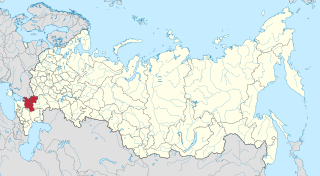
Rostov Oblast is a federal subject of Russia, located in the Southern Federal District. The oblast has an area of 100,800 square kilometers (38,900 sq mi) and a population of 4,200,729, making it the sixth most populous federal subject in Russia. Its administrative center is the city of Rostov-on-Don, which also became the administrative center of the Southern Federal District in 2002.
The North Caucasus, or Ciscaucasia, is a subregion of Eastern Europe in the Eurasian continent. It is the northern part of the wider Caucasus region, and is entirely a part of Russia, sandwiched between the Sea of Azov and Black Sea to the west, and the Caspian Sea to the east. The region shares land borders with Georgia and Azerbaijan to the south. Krasnodar is the largest city within the North Caucasus.
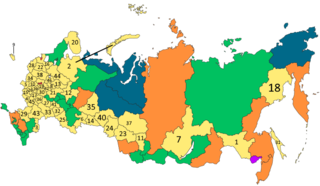
An oblast is a type of federal subject in Russia.

Patriarch Pimen, was the 14th Patriarch of Moscow and the head of the Russian Orthodox Church from 1970 to 1990.

Donetsk is a town in Rostov Oblast, Russia, located on the Seversky Donets River on the border with Ukraine. By road it is located 388 kilometres (241 mi) west of Volgograd. Population: 50,098 (2010 Census); 48,040 (2002 Census); 48,673 (1989 Census); 38,000 (1970). It was previously known as Gundorovka.
The Union of Russian Composers is a state-created organization for musicians and musicologists created in 1932 by Joseph Stalin in the last year of the Cultural Revolution and first Five-Year Plan. It became the official replacement for the various artistic associations which were present before like the Association for Contemporary Music and the Russian Association of Proletarian Musicians, two of the independently directed, music committees. According to Richard Taruskin, the Union had fully materialized into its full-form well before 1948 and in time for the delivery of Zhdanov's Doctrine.
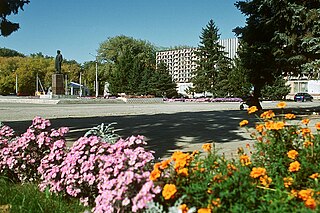
Zernograd is a town and the administrative center of Zernogradsky District in Rostov Oblast, Russia, located 71 kilometers (44 mi) southeast of Rostov-on-Don, the administrative center of the oblast. Population: 26,842 (2010 Census); 28,840 (2002 Census); 26,097 (1989 Census).

Morozovsk is a town and the administrative center of Morozovsky District in Rostov Oblast, Russia, located on the Bystraya River, 265 kilometers (165 mi) northeast of Rostov-on-Don, the administrative center of the oblast. Population: 27,642 (2010 Census); 29,222 (2002 Census); 27,004 (1989 Census).

Salsk is a town and the administrative center of Salsky District in Rostov Oblast, Russia, located on the Sredny Yegorlyk River, 180 kilometers (110 mi) southeast of Rostov-on-Don, the administrative center of the oblast. Population: 56,832 (2020), 61,316 (2010 Census); 61,775 (2002 Census); 61,088 (1989 Census).

The Russian Soviet Federative Socialist Republic, Russian SFSR or RSFSR, previously known as the Russian Soviet Republic and the Russian Socialist Federative Soviet Republic as well as being unofficially known as Soviet Russia, the Russian Federation or simply Russia, was an independent federal socialist state from 1917 to 1922, and afterwards the largest and most populous of the Soviet socialist republics of the Soviet Union (USSR) from 1922 to 1991, until becoming a sovereign part of the Soviet Union with priority of Russian laws over Union-level legislation in 1990 and 1991, the last two years of the existence of the USSR. The Russian Republic was composed of sixteen smaller constituent units of autonomous republics, five autonomous oblasts, ten autonomous okrugs, six krais and forty oblasts. Russians formed the largest ethnic group. The capital of the Russian SFSR was Moscow and the other major urban centers included Leningrad, Stalingrad, Novosibirsk, Sverdlovsk, Gorky and Kuybyshev. It was the first Marxist-Leninist state in the world.

Sergey Ivanovich Syrtsov was a Russian Soviet politician and statesman. Syrtsov is best remembered for having served as the head of the republic government of the Russian SFSR from 1929 until his removal in 1930 for plotting to remove of Joseph Stalin as head of the All-Union Communist Party (bolsheviks).
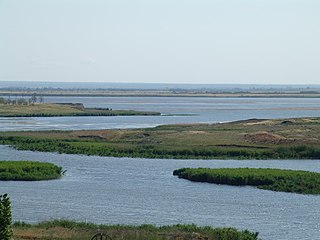
Salsky District is an administrative and municipal district (raion), one of the forty-three in Rostov Oblast, Russia. It is located in the south of the oblast. The area of the district is 3,499 square kilometers (1,351 sq mi). Its administrative center is the town of Salsk. Population: 107,795 ; 49,343 (2002 Census); 45,908 (1989 Census). The population of Salsk accounts for 56.9% of the district's total population.

Volgodonskoy District is an administrative and municipal district (raion), one of the forty-three in Rostov Oblast, Russia. It is located in the eastern central part of the oblast. The area of the district is 1,479 square kilometers (571 sq mi). Its administrative center is the rural locality of Romanovskaya. Population: 33,779 ; 30,170 (2002 Census); 24,690 (1989 Census). The population of Romanovskaya accounts for 24.4% of the district's total population.
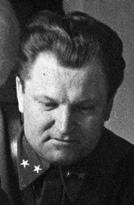
Aleksey Illarionovich Kirichenko was a Soviet Ukrainian politician, who was the first ethnic Ukrainian to head the republic's communist party during the Soviet era. Between 1957 and 1960, he was a Secretary of the Central Committee of the Communist Party of the Soviet Union and the second-highest-ranking official within the party after Nikita Khrushchev.
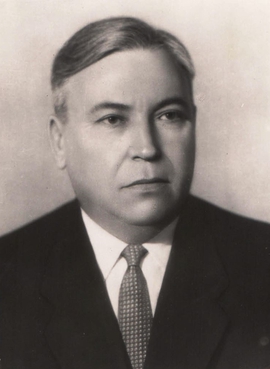
Nikolai Grigoryevich Ignatov was a Soviet politician during the 1950s and 1960s who served as the Chairman of the Presidium of the Supreme Soviet of the Russian Soviet Federative Republic briefly in 1959 and again from 1962 until his death.
Ihor Mykhailovych Tolstykh is a Ukrainian journalist and TV manager. From March 2013 to March 2014 he was the Chief Executive Officer of Rada TV, the television channel of the Ukrainian parliament Verkhovna Rada.
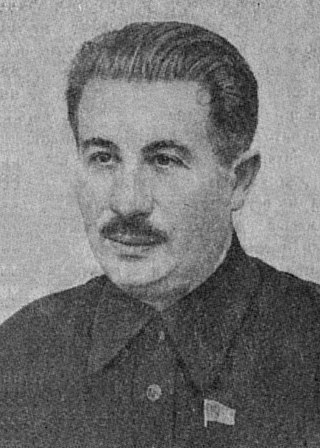
Pyotr Georgiyevich Moskatov was a Soviet union leader and statesman, a deputy of the Supreme Soviet of the Soviet Union of the 1st and 2nd convocations.

Nikolay Vasilyevich Kolomeitsev is a Russian political figure and a deputy of the 2nd, 3rd, 5th, 6th, 7th, and 8th State Dumas.
















